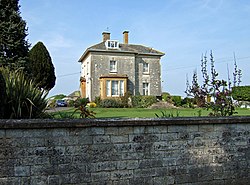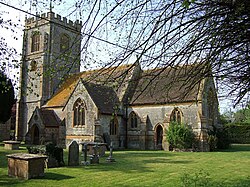Chilton Cantelo
| Chilton Cantelo | |
|---|---|
 The Cypress House |
|
 The Parish Church of St James |
|
| Chilton Cantelo shown within Somerset | |
| Population | 445 (2011) |
| OS grid reference | ST575225 |
| District | |
| Shire county | |
| Region | |
| Country | England |
| Sovereign state | United Kingdom |
| Post town | YEOVIL |
| Postcode district | BA22 8 |
| Dialling code | 01935 |
| Police | Avon and Somerset |
| Fire | Devon and Somerset |
| Ambulance | South Western |
| EU Parliament | South West England |
| UK Parliament | |
Chilton Cantelo is a village and parish in Somerset, England, situated on the River Yeo 5 miles (8 km) north of Yeovil and 4 miles (6 km) east of Ilchester in the South Somerset district. The village has a population of 445. The parish also includes the village of Ashington.
The first part of the name Chilton means the young nobleman's settlement, and the second is from William de Cantilupe (or Cantelo) and his descendants who held the manor between 1201 and 1350. The manor was acquired in the 18th century by the Goodford family who built Chilton Cantelo house which later became the home of Chilton Cantelo School, a small private boarding school which is owned and operated by the Cognita Group.
Ashington Manor has pre Norman Conquest origins, and was in the overlordship of Glastonbury Abbey, but the present building is from the 15th century. The families who held the manor include de Curcelle, and from 1390 to 1901 the St. Barbes, becoming St. Barbe Syenha from 1722. In 1940 it passed to the Church Commissioners.
The parish of Chilton Cantelo was part of the hundred of Houndsborough, while Ashington was part of the Stone Hundred.
The parish council has responsibility for local issues, including setting an annual precept (local rate) to cover the council’s operating costs and producing annual accounts for public scrutiny. The parish council evaluates local planning applications and works with the local police, district council officers, and neighbourhood watch groups on matters of crime, security, and traffic. The parish council's role also includes initiating projects for the maintenance and repair of parish facilities, as well as consulting with the district council on the maintenance, repair, and improvement of highways, drainage, footpaths, public transport, and street cleaning. Conservation matters (including trees and listed buildings) and environmental issues are also the responsibility of the council.
...
Wikipedia

